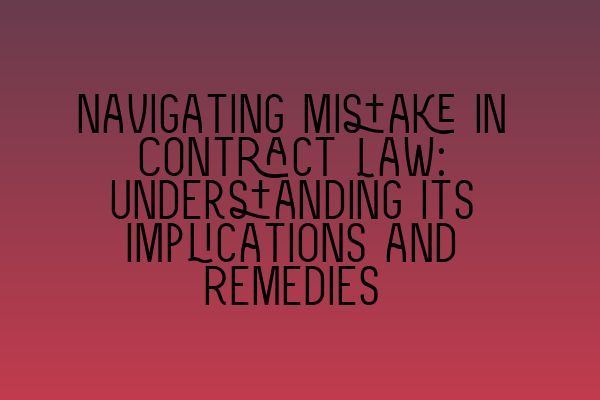Navigating Mistake in Contract Law: Understanding its Implications and Remedies
In the complex world of contract law, mistakes can happen. Whether it’s a simple typographical error or a more significant misinterpretation of terms, mistakes can lead to serious implications for all parties involved in a contract. Understanding the implications of mistakes and the available remedies is crucial for any solicitor or legal professional working in contract law. In this blog post, we will explore the concept of mistake in contract law, its implications, and the remedies available to rectify the situation.
Before we delve into the depths of mistake in contract law, let’s first define what constitutes a mistake in this context. A mistake occurs when one or both parties to a contract have made an error concerning a crucial aspect of the agreement. This error can be in the form of a mutual mistake, where both parties share the same misunderstanding, or a unilateral mistake, where only one party is mistaken.
Now, let’s explore the implications of a mistake in contract law and how it affects the validity of the agreement. When a mistake occurs, it has the potential to impact the enforceability of the contract. If the mistake is significant and goes to the heart of the agreement, it can render the contract void ab initio, meaning that the contract is legally invalidated from the beginning. On the other hand, if the mistake is less substantial, it might only affect specific provisions or terms of the contract.
Understanding the implications of a mistake is essential for solicitors and legal professionals as it helps them determine the appropriate remedies to pursue. In contract law, there are various remedies available to rectify a mistake and protect the interests of the parties involved. Let’s explore some of the common remedies that can be sought in cases of mistake.
1. Rescission: Rescission is a remedy that allows the affected party to have the contract set aside. This remedy is typically sought when the mistake is significant and goes to the heart of the agreement. Rescission aims to restore the parties to their pre-contractual positions and nullify the legal effects of the contract.
2. Rectification: Rectification is a remedy sought when there is evidence to prove that the written contract does not accurately reflect the true intentions of the parties. This remedy allows the court to amend or “rectify” the contract to reflect the intended agreement accurately. It is important to note that rectification is only available if there is convincing evidence of the true intentions of the parties.
3. Damages: Damages are a common remedy sought in contract law when a mistake has resulted in financial loss or damages to one of the parties. The aim is to compensate the injured party for the losses suffered due to the mistake. Damages can be in the form of compensatory, nominal, or even punitive damages, depending on the circumstances.
4. Quantum Meruit: Quantum Meruit is a Latin term meaning “as much as deserved.” It is a remedy sought when one party has provided goods or services under a mistaken belief that a valid contract exists. This remedy allows the party to recover the reasonable value of the goods or services provided.
It is vital for solicitors and legal professionals to meticulously analyze the circumstances surrounding the mistake and choose the most suitable remedy for their client’s situation. Remember, each case is unique, and the choice of remedy will depend on various factors such as the nature of the mistake, the intentions of the parties, and the extent of the losses suffered.
As an SEO expert at SQE Contract Law, I understand the importance of providing valuable resources and information to our readers. If you’re interested in further enhancing your knowledge and skills in contract law or preparing for the SQE exams, I highly recommend checking out these related articles:
– SQE 1 Practice Exam Questions: This article provides practice questions to help you test your knowledge and familiarize yourself with the type of questions you may encounter in the SQE 1 exam.
– SQE 1 Practice Mocks FLK1 FLK2: Practice mocks are an excellent way to assess your understanding of the SQE 1 exam materials and identify areas that require further study. This article offers practice mocks for the FLK1 and FLK2 modules.
– SQE 2 Preparation Courses: If you’re preparing for the SQE 2 exam, this article provides details on preparation courses that can help you effectively prepare for the exam and enhance your chances of success.
– SQE 1 Preparation Courses: For those focusing on the SQE 1 exam, this article offers information on preparation courses designed to equip you with the knowledge and skills necessary to excel in the exam.
– SRA SQE Exam Dates: Stay up to date with the latest exam dates and schedules for the SRA SQE exams by referring to this article. Knowing the exam dates in advance allows you to plan your preparation effectively.
In conclusion, navigating mistakes in contract law requires a solid understanding of their implications and the available remedies. By comprehending the consequences of mistakes and knowing which remedies to seek, solicitors and legal professionals can effectively represent their clients’ interests and ensure fair outcomes. Remember, every mistake presents an opportunity for growth and learning, so never underestimate the power of knowledge and preparation in contract law.
Stay tuned to our blog for more insightful articles on contract law and other essential legal topics.
